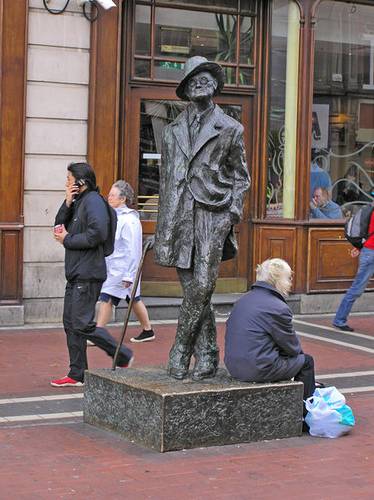If this magic square worked upside down, this one works when reversed, “mirrorwise”:
| 96 | 64 | 37 | 45 |
| 39 | 43 | 98 | 62 |
| 84 | 76 | 25 | 57 |
| 23 | 59 | 82 | 78 |
| 54 | 73 | 46 | 69 |
| 26 | 89 | 34 | 93 |
| 75 | 52 | 67 | 48 |
| 87 | 28 | 95 | 32 |
If this magic square worked upside down, this one works when reversed, “mirrorwise”:
| 96 | 64 | 37 | 45 |
| 39 | 43 | 98 | 62 |
| 84 | 76 | 25 | 57 |
| 23 | 59 | 82 | 78 |
| 54 | 73 | 46 | 69 |
| 26 | 89 | 34 | 93 |
| 75 | 52 | 67 | 48 |
| 87 | 28 | 95 | 32 |

In 1982, writer Chuck Ross transcribed the screenplay of Casablanca. He changed the title to Everybody Comes to Rick’s, and he changed the piano player’s name to Dooley Wilson. Then he submitted it to 217 Hollywood agencies.
Only 85 read it. Of those, 38 rejected it outright, 33 recognized it (but only eight specifically as Casablanca), and only three declared it commercially viable.
One suggested turning it into a novel.
See also The Steps Experiment.
Protagoras, an Athenian rhetorician, had agreed to instruct Evalthus in rhetoric, on condition that the latter should pay him a certain sum of money if he gained his first cause. Evalthus when instructed in all the precepts of the art, refused to pay Protagoras, who consequently brought him before the Areopagus, and said to the Judges — ‘Any verdict that you may give is in my favour: if it is on my side, it carries the condemnation of Evalthus; if against me, he must pay me, because he gains his first cause.’ ‘I confess,’ replied Evalthus, ‘that the verdict will be pronounced either for or against me; in either case I shall be equally acquitted: if the Judges pronounce in my favour, you are condemned; if they pronounce for you, according to our agreement, I owe you nothing, for I lose my first cause.’ The Judges being unable to reconcile the pleaders, ordered them to re-appear before the Court a hundred years afterwards.
— Edmund Fillingham King, Ten Thousand Wonderful Things, 1860

Tourists marvel at the architects of Stonehenge, which apparently was built to align with the midsummer sunrise and the midwinter sunset.
Many then innocently return to New York — where on Dec. 5 and Jan. 8 each year the setting sun aligns perfectly with the east-west streets in Manhattan’s main grid.
ABSTEMIOUS, ADVENTITIOUS, and FACETIOUS contain all the vowels in alphabetical order.
SUBCONTINENTAL and UNCOMPLIMENTARY contain them in reverse order.

Newfoundland naturalist Moses Harvey collected the first complete specimen of a giant squid in December 1873.
He kept it in his bathtub.
A curious circumstance occurred at the Bush Tavern, Bristol, on Monday night, May the 4th, about eleven o’clock. A young man, who has since been discovered to be a sailor, belonging to the Union ship of war, lying at Plymouth, went to bed apparently composed; but before the servant had left the room five minutes, the house was alarmed by his cries of ‘Help me out,’ and by the breaking of glass, occasioned by his bursting through the sash. Though asleep, he continued walking from one roof to the other, and along the narrowest ridges, and at length jumped from the surprising height of thirty feet, without receiving any material injury. He was conveyed to bed, and left the inn the following morning on his journey for Plymouth.
— Oxford Herald, May 9, 1812

A young man once accosted James Joyce and asked, “May I kiss the hand that wrote Ulysses?”
Joyce replied, “No, it did a lot of other things, too.”
The world will end on Nov. 13, 2026. That’s according to Austrian cyberneticist Heinz von Foerster, who calculated in a 1960 issue of Science that the human population would reach infinity on that date.
He was joking, but he had a point. To date, population growth hasn’t really inhibited human societies. They’ve just created technology to support larger crowds, which have spawned more inventors, who create more technology, and so on.
Von Foerster’s equation fit 25 data points from the birth of Jesus to 1958, and it stayed on track through 1973. His point was that the doubling time of the human population has been steadily falling, and at this rate it would reach zero in 2026 — so a fundamental change, of some kind, must be coming.